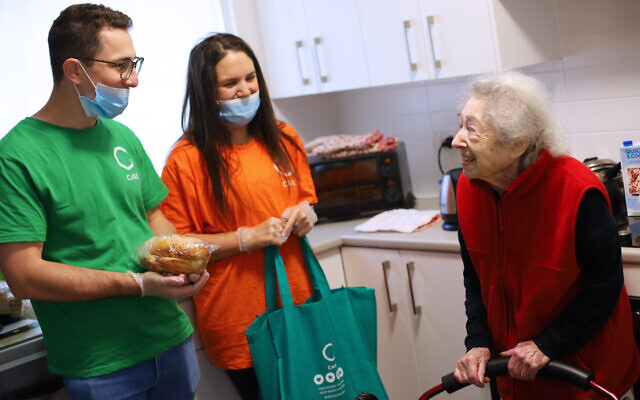How our traditions help in these difficult times
'The Jewish values of tzedakah, gemilut chasadim and centrality of community, continue to guide our leaders and organisations to respond to this crisis'.

COVID-19 has brought change, restrictions and difficulties to all of us in varying degrees. For many in our community, these changes have brought a sudden, almost overnight devastating change to their circumstances. The impact of this sudden change can be profound on one’s sense of self or identity. Our identity is an enduring sense of self, comprised of our traits, roles, beliefs and group identification. Major life events, changes and transitions influence and shape our identity. Changes that come with status are often celebrated – for example bar/bat mitzvah, weddings and career achievements – and are comfortably incorporated into our identity. Changes that come with grief or loss are more complex to process and integrate, potentially even traumatic.
As a psychologist, I have always been inspired by the psychologically intuitive nature of Jewish rituals, particularly those pertaining to grief and loss. Our rituals steer both the mourners and the community around them through stages of grief. The familiarity and structure of these rituals provides comfort and a steadying mast in an otherwise overwhelming and disorienting fog. These rituals do not ease our pain directly, but do provide a path to move through. This movement itself promotes a healing process and gradual incorporation of one’s new identity following grief and loss.
But what about changes and transitions for which we don’t have rituals or traditions? Indeed, COVID has thrust much change of this nature upon us, the word “unprecedented” being frequently used to describe the circumstances we find ourselves in. While we don’t have COVID-specific Jewish rituals to guide us during this difficult time, our traditions and values have had much to offer us, as has been evident in the plethora of initiatives by individuals, organisations, schools and shules in recent times.
These initiatives stem largely from the emphasis our tradition places on community and tzedakah. There are many psychologically astute aspects to the practice of tzedakah within Judaism. Tzedakah is not merely the act of giving money to the needy, but it must be done in a way that protects the dignity of the recipient. Gemilut chasadim, acts of lovingkindness, is another important aspect of tzedakah and is not limited to the needy but is applicable more widely. There is an inherent understanding that tzedakah is something we will both give and receive at some stage, and an effort to blur the lines of distinction to protect the dignity of each individual and preserve the fabric of the community.
COVID restrictions and the impact of COVID will eventually ease for the community at large, but for many individuals the impact on their lives and the losses they have endured will continue well beyond lockdown. For individuals suffering sudden financial devastation, a new sense of vulnerability or the tyranny of isolation, the damage to their identity may be profound.
I know the lengths to which many of our communal organisations have gone to offer inclusive, non-stigmatising and confidential assistance to respect the dignity of those who are suffering. I know the sensitivity that exists behind the scenes which understands the identity-trauma for those seeking help for the first time.
The reality, or the new reality, in which we now find ourselves is that for many, the lines between those who give tzedakah and those who receive are more blurred than we may have ever previously experienced. There is a new complexity of identity for many who are experiencing vulnerability perhaps for the first time, one for which there is no clear path, no comforting ritual to assist in coming to terms with it.
One example of a response to this new reality is an initiative by C Care in Melbourne who have offered a low-cost kosher meal service. The introduction of a small fee implies an understanding that many people, suddenly confronted by financial distress, won’t identify as recipients of tzedakah. It allows those who identify as givers of tzedakah to continue to give support to C Care while also receiving some much-needed kindness and help during these difficult times, and blurs the lines between giving and receiving in a beautifully sensitive and inclusive way.
This is just one example of a wider trend within our schools, shules and communal organisations leading to many innovative, thoughtful and inclusive initiatives in recent times. The Jewish values of tzedakah, gemilut chasadim and centrality of community, continue to guide our leaders and organisations to respond to this crisis in a way that is perceptive of the psychological impact on those most vulnerable. This will no doubt be helpful to many individuals and families among us, providing the steadying mast of familiarity in an otherwise overwhelming and disorienting fog as we come to terms with our new normal, our new reality, and cushioning the impact for those who are coming to terms with significant loss.
Ronit Joel is a psychologist and director of Sage Psychology Group. She is a committee member of the Australian Jewish Psychologists and coordinates a pro-bono counselling service for Jewish Care Victoria.

comments